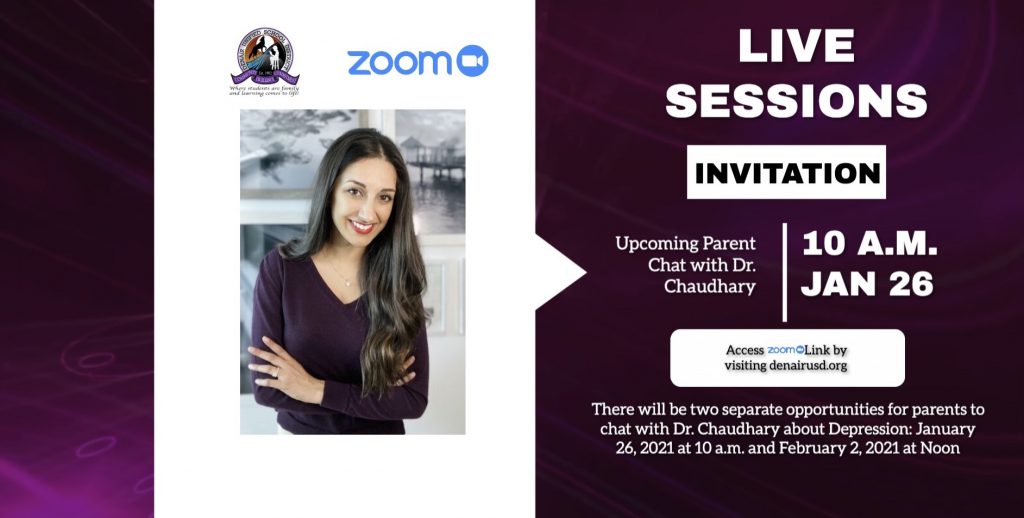
The Denair Unified School District is partnering with a renowned Stanford psychiatrist to make it easier to discuss mental health issues potentially facing staff, students and their families. The arrangement is believed to be the first of its kind in Stanislaus County and among just a handful nationwide.
The partnership began Tuesday, when the first in a yearlong series of videos was posted on the district’s Facebook page. In the video, Dr. Neha Chaudhary, a child, adolescent and adult psychiatrist, and Denair Superintendent Terry Metzger introduce the program and talk about the first topic – childhood depression.
After each video is posted, Chaudhary will host live Zoom calls on the next two Tuesdays, giving parents and others an opportunity to discuss questions and concerns and get additional information. For instance, the Zoom follow-ups to the issue of childhood depression will be on Tuesday, Jan. 26 from 10 to 11 a.m. and Tuesday, Feb. 2 from noon to 1 p.m. Links will be posted on the district website.
Spanish translation of the videos and the Zoom calls will be available upon request.
The program is being funded through a grant from Legacy Health Endowment in Turlock, which has worked with the district on a variety of other health initiatives in the past few years.
The timing of the new program is directly related to the impact of the COVID-19 pandemic on Denair’s 1,300 students, their families and school employees, Metzger said. Most students have been taught exclusively via distance learning since Denair’s four campuses were closed in March. The situation has created stress at every level of the education system.
“Our work with Dr. Chaudhary … is a result of conversations with Legacy Health Endowment about preparing the school system for the return of students to campus,” Metzger explained, adding that Legacy CEO Jeffrey Lewis “has been very concerned about mental health issues for some time — and not just for children, but also for adults.”
Chaudhary comes to the project with impressive credentials. She is double board-certified from Harvard and is the founder of Stanford Brainstorm, which was started in 2016 as the world’s first academic lab dedicated to mental health innovation and entrepreneurship.
Metzger described Chaudhary’s role as instructional rather than clinical. The goal is to give parents tangible resources and information that will help them with any issues their children may be experiencing.
In the first video, for instance, Chaudhary said that “depression may look a little different for everybody.”
“A lot of kids I’m seeing today are struggling with signs and symptoms of depression,” she said. “Parents aren’t sure what’s going on or whether they should be worried. Now, if kids are expressing anything that’s concerning from the safety perspective, like having thoughts of self-harm or suicide, that’s a more clear signal that you need to seek professional help. But what about when it’s less obvious?”
Chaudhary then described some of the symptoms that children may experience — crying and being emotional, lack of motivation (to get dressed, to complete schoolwork, not wanting to have fun, holed up in their room), being angry or lashing out at family and friends, difficulty with sleep, poor appetite and low energy.
She advised parents to “trust your gut,” that “you’re going to know” if something is wrong with their child. She also assures them that depression is “perfectly treatable” and that recognition is the first step in that process.
The hourlong Zoom calls on the two Tuesdays after a video is posted will give parents an opportunity to talk directly with Chaudhary and ask questions.
Metzger said there are other free resources for families who need help. She advised them to call the guidance counselor at their child’s campus, who will then direct parents to “in-house or community-based mental health clinicians.” Chaudhary will be working with the school counselors.
“School counselors are not therapists so while they have some training in behavioral health, it’s not their main focus,” Metzger said. “Dr. Chaudhary will be doing some teaching of what to look for and how to support mental health needs to better equip our counselors to refer families to the right resources.”
A second part of the mental health initiative involves the district surveying teachers about mental health topics they’d like to discuss with an expert. Once that information has been collected, Metzger said, Chaudhary will conduct a combination of teaching and drop-in sessions “to help teachers build their own understanding and hopefully apply their learning to their work with students as well as in their own lives and families.”
Lewis, the Legacy Health CEO, said the goal of the mental health series is “to ensure that when students return to school in person, everyone is ready and prepared to help them.”
He said Denair was a natural place to start because of its “outstanding leadership.” He also would like to extend the program to other districts, saying, “Results will dictate where we go from here.”
Legacy already has piloted mental health programs locally aimed at school superintendents and other administrators.
“Now, our focus turns to school counselors who have to address the myriad of problems students have and will return to school with,” said Lewis. “We believe that we have to ensure that public school professionals are healthy both mentally and physically – if they are not, the transition back to school for students could be even more challenging.”
Legacy has funded free mental health services in Denair Unified to students and their families since the fall of 2018 in partnership with Sierra Vista Child & Family Services of Modesto. A full-time mental health clinician is stationed at Denair Middle School to work with students and their families from all DUSD campuses.
